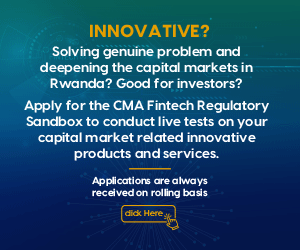How to invest through the capital market?
What is an investment?
Generally, every activity that is done today but which has a “payday” at a later date can be described as an investment. Investment involves postponing your consumption today in order to put your savings where they can grow to more in future.
It is an activity which involves putting capital into a business with expectation of generating revenue and therefore returns as compensation for the capital.
Why invest?
Investment is a necessary condition for creating wealth. Investment helps in realizing one's dream such as buying a home, a vehicle, a farm, a factory, a business, or even education. Investment puts your savings to work to earn returns. It is impossible to create wealth without investing. Investing gives you the key to secure the future. Investing can let you have a comfortable retirement. Investment is a time-honored practice for increasing your wealth.
What does one buy in the Capital Market?
Shares and bonds are the most common products to invest in capital markets.
What is a bond?
A bond is a debt. When you buy a Treasury Bond issued by Government you are a lender and the Government is a borrower. Equally, when you buy a bond issued by a company, the company is a borrower and you are a lender. The bonds will promise to pay you an interest income periodically.
What are equity/Shares?
A share is a unit of ownership in a company. When you buy a share in a company, you become one of the owners of the company to the extent of your shareholding. You participate in the affairs of the company through your voting rights at the General meetings. When the company reports profits and decides to distribute the profits, you are paid a dividend income.
Who is an investor?
An investor is anyone who decides to put part of his/her funds in an investment for future benefit. For example, Mr. Rukara who has decided to use 10% of his monthly salary to buy shares or bonds can be described as an investor. An investor has some characteristics including an investment objective, a time horizon for his investment, an expectation of return and money to invest.
When can you start investing?
The best time to start investing is NOW. Generally, the earlier you start in life, the longer the time you have to invest.
Monitoring your investment?
An investment is not supposed to be done passively. It is important for an investor to actively follow or monitor his investment. Monitoring your investment involves keeping your eye on the developments within the company you invested in, the stock market and the economy as a whole. It is a “hands on” kind of business. For investors on the Rwanda OTC market, you can monitor your investments by keeping active communication lines with your broker, by reading the business pages of the newspapers, listening to local FM station and TV or simply visiting CMAC website or visiting CMAC offices.
How to open an account and trade?
A prospective investor on the ROTC must open an account with a brokerage house prior to trading in securities. The process of opening an account is very simple and starts by making contact with a broker of your choice. The investor then completes a purchase order (or sale order) giving personal particulars (including contact address etc) and the instructions on the transactions (that is what security to buy/sell, the transaction price, etc). Where the investor intends to sell securities, he will be required to submit his security certificate. In the case of a purchase, the investor will be required to make deposit covering the value of the transaction.
Trading arrangement
Only authorized Members (stock brokers) can trade on the RSE market. An authorized member is a stock broker who has been admitted by the CMA to be a trader in securities. Trading on the RSE market takes place every working day of the week from 09.00am to 12noon. Trading is open to the general public.
How am I protected?
a) CMA ensures that only competent and credible professionals are licensed to serve the market.
b) CMA supervises all members of RSE to ensure compliance with regulatory requirements
c) CMA ensures that prospectuses of issuers have adequate disclosure for decision making
d) CMA ensures that there are periodic reports and all price sensitive information are released once they are available
e) National public education and awareness campaigns create well informed investors
However, investor protection in capital market is aimed at providing fair play to investors. But it is not aimed at protecting an investor from his/her own errors of judgment or ensuring that he/she gets profits all the time. The law will protect investors who have been victims of fraud, dishonesty and unfair practices. All investors face the normal market risks. The regulator in this market is CMA.
Latest news
-
Strong Regulation Is the Bedrock of a Strong Stock Exchange as RSE Marks 15 Years
-
CMA Meets Investment Managers to Accelerate Growth of Rwanda’s Asset Management Industry
-
Rwanda connects the commodities exchange to capital market finance for farmers
-
Call for Public Comments on the Draft Regulation Governing Intermediary Service Platform Operators
-
CMA Encourages Young Professionals to Invest Through Rwanda’s Capital Market
-
Rwanda Issues Central Securities Depository Regulations to Support Capital Market Growth
-
CMA Board Appoints Mr. KAREKEZI Ngabonziza (Eric) as Acting Chief Executive Officer
-
CMA Rwanda Publishes Annual Report for the 2024/25 Financial Year
-
CMA Reaches 3,000+ Students on Investing in Rwanda’s Capital Market
-
CMA Welcomes New Board Members, Bids Farewell to CEO Tsheole

